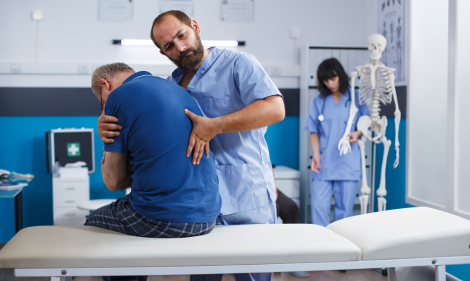Breaking the Silence: The True Impact of Spinal Cord Injuries After Car Accidents
Car accidents are unpredictable and often life-altering. Among the most devastating consequences are spinal cord injuries (SCI), which can dramatically change mobility, independence, and long-term health. Unlike a broken bone that can heal with time, damage to the spinal cord often disrupts nerve pathways permanently, causing paralysis, chronic pain, and loss of bodily function.
At Specialty Care Clinics, we understand the complexity of spinal cord injuries after auto accidents and offer comprehensive care—from emergency treatment to long-term rehabilitation—so patients can rebuild their lives.

Why Spinal Cord Injuries Are So Devastating
The spinal cord is the body’s communication highway. Damage caused by auto accidents can result in:
- Loss of movement in arms or legs (paralysis).
- Chronic pain from nerve damage.
- Bladder and bowel dysfunction, severely affecting quality of life.
- Respiratory difficulties, especially with cervical (neck) injuries.
- Emotional trauma from sudden lifestyle changes.
Even minor crashes can result in undetected spinal trauma, making immediate medical evaluation critical.
Types of Spinal Cord Injuries After Car Accidents
- Complete SCI – Full paralysis below the injury site.
- Incomplete SCI – Partial movement or sensation retained.
- Cervical Injuries – Affect the neck, often resulting in quadriplegia.
- Thoracic Injuries – Impact trunk and chest muscles.
- Lumbar/Sacral Injuries – Affect hips, legs, and bladder control.
Symptoms You Should Never Ignore
- Intense back or neck pain
- Loss of sensation or tingling in limbs
- Muscle weakness or spasms
- Difficulty breathing or coughing
- Loss of bladder/bowel control
Diagnosis & Treatment at Specialty Care Clinics
- Neurological exams for reflexes and coordinatio
- MRI/CT scans to detect swelling or compression
- Emergency stabilization with braces or traction
- Surgery for fractures or herniated discs
- Medications to reduce inflammation
- Rehabilitation including physical, occupational, and psychological therapy
Long-Term Recovery and Rehabilitation
Recovery is not just physical—it’s emotional and social. At our Texas clinics, we design personalized treatment plans with:
- Advanced rehabilitation technology
- Pain management
- Adaptive devices (wheelchairs, braces, mobility aids)
- Ongoing counseling for patients and families
Conclusion
Spinal cord injuries after car accidents can feel overwhelming, but with early treatment and specialized rehabilitation, recovery and independence are possible. Specialty Care Clinics is here to provide expert care, guidance, and hope at every stage of the journey.
Need Immediate Help? Call (972) 865-4454 to book an appointment today.
FAQs
Q1: Can spinal cord injuries heal completely?
Some incomplete injuries improve with rehabilitation, but complete injuries often result in permanent damage.
Q2: How soon should I see a doctor after an accident?
Immediately—even if you feel fine. Spinal injuries can worsen if untreated.
Q3: What’s the difference between paraplegia and quadriplegia?
Paraplegia affects the lower body; quadriplegia affects all four limbs.
Q4: Is surgery always required for SCI?
No. Some cases are managed with medication, therapy, and monitoring.
Q5: Can I regain independence after a spinal cord injury?
Yes—with therapy, adaptive devices, and support, many patients live fulfilling lives.
